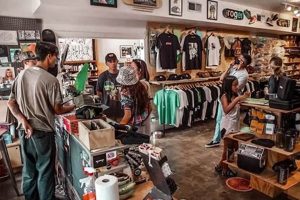The subject represents a retail establishment specializing in skateboarding equipment and apparel, potentially incorporating design elements or a thematic aesthetic inspired by Japanese samurai culture. This could manifest in the store’s name, logo, interior design, or the selection of brands and products offered.
The value of such a business lies in its ability to cater to a specific niche within the skateboarding community. By differentiating itself with a unique theme, it can attract customers who appreciate the combination of skateboarding and Japanese aesthetics. This branding can foster a strong sense of community and customer loyalty, potentially leading to increased sales and brand recognition. Historically, niche retail businesses have thrived by offering specialized products and experiences not readily available in larger, generalized stores.
The following sections will delve into aspects such as the products and services offered, target demographics, marketing strategies, and competitive landscape relevant to a venture operating under this concept. Subsequent analysis will also cover operational considerations and potential avenues for growth and expansion.
Skateboarding Guidance
The following points offer suggestions applicable to skateboarding activities, particularly concerning equipment selection and safety practices.
Tip 1: Assess Board Component Quality. Inspect the trucks, wheels, and deck for durability and appropriate sizing relative to the intended skateboarding style. Higher-quality components enhance performance and extend the lifespan of the skateboard.
Tip 2: Prioritize Protective Gear Usage. Helmets, knee pads, elbow pads, and wrist guards mitigate the risk of injury. Consistent use of protective gear is paramount, especially for novice skateboarders.
Tip 3: Evaluate Skate Shoe Construction. Skate shoes designed with reinforced stitching, durable materials, and adequate cushioning offer superior grip, board feel, and impact absorption.
Tip 4: Implement Regular Equipment Maintenance. Clean bearings, tighten loose hardware, and replace worn-out components to ensure optimal performance and prevent accidents.
Tip 5: Practice in Controlled Environments. Skateboarding skill development should commence in designated skate parks or flat, obstacle-free surfaces to minimize the potential for collisions and injuries.
Tip 6: Understand Local Skateboarding Regulations. Familiarize oneself with and adhere to local ordinances pertaining to skateboarding activity, including permitted locations and restricted areas. Compliance with these regulations promotes safety and avoids legal repercussions.
Adherence to these recommendations contributes to a safer and more enjoyable skateboarding experience, minimizing the likelihood of accidents and prolonging equipment longevity.
The subsequent section will explore the potential evolution and future trends within the skateboarding industry.
1. Unique Thematic Branding
Unique thematic branding serves as a foundational element for a venture such as a “samurai skate shop.” The thematic element, in this case, Japanese samurai culture, distinguishes the retail establishment from generic competitors. This differentiation influences all aspects of the business, from store design and product selection to marketing strategies and customer interaction. Without unique branding, the shop risks blending into the saturated skateboarding retail market, losing its ability to attract a dedicated customer base. Cause and effect are evident; a strong theme attracts a specific customer demographic, increasing brand recognition and potentially driving sales. A lack of distinct branding leads to reduced market visibility and customer loyalty.
The importance of thematic branding is further exemplified by examining other successful niche retail businesses. Consider surf shops that emphasize a specific surf culture or outdoor gear retailers that focus on a particular activity like rock climbing or backcountry skiing. These shops cultivate a sense of community and offer an experience that goes beyond simply selling products. A “samurai skate shop” could adopt a similar strategy by incorporating traditional Japanese art into its store decor, offering workshops on Japanese board maintenance techniques, or even stocking limited-edition skateboards designed by Japanese artists. This thematic consistency creates a cohesive brand identity that resonates with customers interested in both skateboarding and Japanese culture, thereby enhancing brand loyalty and customer satisfaction. It provides them with not just skateboarding equipment, but a culturally-infused experience.
In conclusion, unique thematic branding is not merely an aesthetic consideration for a “samurai skate shop;” it is a critical component that dictates market positioning and customer engagement. The thematic branding drives customer acquisition, enhances brand recognition, and ultimately contributes to the long-term sustainability of the business. Without a strong thematic foundation, the shop may struggle to establish itself within the competitive skateboarding retail landscape and to foster lasting customer relationships. The challenges lie in maintaining authenticity and avoiding cultural appropriation while effectively integrating the theme into all facets of the business.
2. Niche Market Targeting
Niche market targeting is a critical element for the viability of a specialized retail business. For the “samurai skate shop” concept, this involves identifying and focusing on a specific segment within the larger skateboarding market. This target segment likely comprises individuals with an interest in both skateboarding and Japanese culture, particularly the samurai aesthetic. The cause-and-effect relationship is evident: targeted marketing efforts directed at this specific demographic increase the likelihood of attracting customers who resonate with the store’s theme. A broad, untargeted approach risks diluting marketing resources and failing to capture the attention of the intended audience. Neglecting niche market targeting diminishes the unique value proposition of the “samurai skate shop” and reduces its competitive advantage.
The importance of niche market targeting becomes clear when considering real-world examples. Businesses that successfully target specific niches often achieve higher customer loyalty and brand recognition. For instance, consider the prevalence of boutique coffee shops that target coffee aficionados with specific roasting techniques or origin stories. Similarly, a “samurai skate shop” could focus on sponsoring skateboarding events within Japanese cultural festivals, partnering with anime conventions to set up booths, or advertising in online forums dedicated to Japanese art and skateboarding. These activities are more likely to resonate with the target demographic than generic advertising campaigns. Furthermore, understanding the nuances of this niche allows for tailored product offerings, such as decks featuring samurai-inspired artwork or skate shoes with Japanese textile patterns, further enhancing customer engagement.
In conclusion, niche market targeting is not merely a theoretical consideration; it is a practical necessity for the success of a “samurai skate shop.” By precisely identifying and engaging the target audience, the business can maximize its marketing effectiveness, cultivate a loyal customer base, and establish a distinctive brand identity. The challenge lies in accurately defining the target demographic and consistently aligning marketing efforts and product offerings to appeal to this specific group. Ultimately, a well-executed niche market targeting strategy enhances the shop’s long-term viability and contributes to its overall success in the competitive retail landscape.
3. Quality Product Selection
Quality product selection is paramount to the success of a “samurai skate shop.” The retail environment specializing in skateboarding equipment requires adherence to industry standards for durability, safety, and performance. The inclusion of substandard equipment will negatively impact customer satisfaction, damage brand reputation, and potentially lead to product liability issues. The cause-and-effect relationship is direct: quality products foster customer trust and drive repeat business, whereas inferior products erode customer confidence and hinder long-term growth. This selection is not merely an aesthetic consideration but a functional imperative reflecting on the business’s commitment to the skateboarding community.
The importance of quality product selection can be observed in other specialty retail sectors. For example, a high-end bicycle shop would stock components known for their reliability and performance, such as Shimano or SRAM drivetrains, rather than generic alternatives. Similarly, the “samurai skate shop” should prioritize established skateboard brands renowned for quality decks, trucks, wheels, and bearings. This might include brands that already align with Japanese aesthetics, or partnerships could be formed with companies to produce limited-edition products with a thematic focus. Furthermore, providing experienced staff capable of advising customers on the suitability of equipment based on their skill level and riding style enhances the value proposition. The inclusion of reputable brands and knowledgeable staff builds credibility and reinforces the shop’s commitment to providing a premium skateboarding experience.
In conclusion, quality product selection is not simply a desirable attribute but a foundational element for a “samurai skate shop.” By prioritizing reliable, safe, and high-performing skateboarding equipment, the business enhances customer satisfaction, fosters brand loyalty, and establishes a reputation for excellence within the skateboarding community. The challenge lies in balancing quality with price point to appeal to a broad customer base while maintaining a commitment to superior product standards. This balance allows the shop to maintain its competitive edge and cultivate customer retention, ensuring its sustained success within the skateboarding retail landscape.
4. Community Engagement Focus
A community engagement focus is intrinsically linked to the long-term viability of a “samurai skate shop.” This retail entity, by its nature, operates within a subculture characterized by a strong sense of community. Active participation in local skateboarding events, sponsorship of skateboarding teams, and the organization of workshops or demonstrations fosters a sense of belonging and reciprocity with potential customers. The absence of community engagement translates directly into a diminished brand presence and reduced customer loyalty. A direct cause-and-effect relationship exists: active community participation engenders brand affinity, while a passive approach leads to alienation and reduced market penetration. The business must actively integrate itself within the pre-existing skateboarding culture to establish credibility and trust.
The importance of community engagement can be illustrated through analogous examples within the retail sector. Local breweries, for instance, frequently host events, collaborate with local restaurants, and sponsor community initiatives to cultivate a loyal customer base. Similarly, a “samurai skate shop” could partner with local artists to create custom skateboard designs, host skateboarding competitions at local parks, or offer free board maintenance clinics. These initiatives demonstrate a commitment to the local skateboarding community beyond mere product sales. Furthermore, the shop could create a physical space for community gathering, providing seating areas, video game consoles featuring skateboarding games, or hosting film screenings of skateboarding documentaries. This approach transforms the retail space into a social hub, increasing foot traffic and fostering a sense of camaraderie among customers.
In conclusion, a community engagement focus is not merely a supplementary marketing tactic but an essential component for a “samurai skate shop.” By actively participating in and supporting the local skateboarding community, the business can cultivate brand loyalty, enhance its reputation, and ensure its long-term sustainability. The challenge lies in maintaining authenticity and avoiding any perception of exploitation or superficiality. Genuine community engagement requires a sustained commitment to the values and needs of the skateboarding community, ensuring the shop is viewed as a valuable partner rather than simply a commercial entity. This engagement is key to thriving in a niche market where community connections and peer recommendations hold significant sway.
5. Strategic Location Analysis
Strategic location analysis constitutes a fundamental component in the establishment and sustained operation of a retail enterprise. Its importance is amplified in the case of a niche market venture, such as a “samurai skate shop,” where accessibility to the target demographic and alignment with cultural or subcultural landscapes are critical determinants of success. This analysis dictates the potential reach, visibility, and customer acquisition rate of the business.
- Demographic Concentration
The proximity to areas with a high concentration of the target demographic individuals interested in skateboarding and Japanese culture is essential. Identifying neighborhoods with a significant population of young adults, students, or enthusiasts of Japanese arts and entertainment is crucial. For example, a location near a university campus with a Japanese studies program or in a district known for its anime and manga shops would be strategically advantageous. This ensures immediate access to the core customer base.
- Proximity to Skateboarding Infrastructure
The physical distance to skateboarding parks, skate spots, or other skateboarding-related venues directly influences customer traffic. A location within walking or cycling distance of these facilities increases the likelihood of spontaneous visits and repeat patronage. Furthermore, a visible presence near these areas allows the shop to establish itself as a central hub for the local skateboarding community. Real-world examples include skate shops located near famous skate parks that benefit from consistent foot traffic from skaters.
- Competitive Landscape Assessment
Analyzing the existing competitive landscape involves identifying the presence and strengths of competing skateboarding retailers within a defined radius. Over-saturation of skateboarding shops in a specific area may dilute market share, while a lack of competition presents an opportunity to dominate the local market. However, a complete absence of competition may also indicate a lack of demand or market awareness. The “samurai skate shop” should differentiate itself through its unique thematic focus to stand out in a competitive environment. Strategic positioning can offer a competitive advantage against generic retailers.
- Accessibility and Visibility
The physical accessibility and visibility of the location contribute significantly to its overall value. Factors to consider include ease of access via public transportation, availability of parking, and the visibility of the storefront from main thoroughfares. A location with high foot traffic and clear signage maximizes exposure to potential customers. Real estate in areas with high visibility often commands a premium, but the increased customer traffic can justify the investment. A shop hidden away in an obscure location will struggle to attract customers regardless of its thematic appeal.
These facets of strategic location analysis are interwoven and mutually reinforcing. The optimal location for a “samurai skate shop” balances demographic concentration, proximity to skateboarding infrastructure, a manageable competitive landscape, and high accessibility and visibility. Thorough assessment of these factors maximizes the probability of success, establishing a solid foundation for sustained growth and community integration. The ability to accurately assess and respond to these variables is crucial for navigating the inherent challenges of the retail environment.
Frequently Asked Questions
The following section addresses common inquiries regarding the operations, product offerings, and thematic focus of a retail establishment specializing in skateboarding equipment and apparel under the designated nomenclature.
Question 1: What distinguishes a “samurai skate shop” from a standard skateboarding retailer?
The primary distinction lies in the incorporation of Japanese samurai culture as a central theme. This thematic element permeates the store’s design, product selection, and overall customer experience, differentiating it from generic or purely skateboarding-focused retailers. Expect potential influences in artwork, apparel, and product naming conventions.
Question 2: Does the thematic focus limit the range of skateboarding products offered?
While the theme influences aesthetic choices, the shop remains committed to providing a comprehensive selection of skateboarding equipment. Product selection encompasses a range of decks, trucks, wheels, bearings, and protective gear suitable for various skill levels and skateboarding styles. The theme does not compromise functional diversity.
Question 3: How does the shop ensure the quality and safety of its skateboarding products?
The shop adheres to industry standards for skateboarding equipment quality and safety. Products are sourced from reputable manufacturers known for producing durable and reliable components. Additionally, staff members are trained to provide informed advice on equipment selection to ensure customer safety.
Question 4: Does the shop offer services beyond retail sales?
Potential additional services may include skateboard repair and maintenance, custom skateboard assembly, and skateboarding lessons or workshops. These services enhance the customer experience and foster a sense of community within the skateboarding scene.
Question 5: How does the shop ensure the responsible and respectful representation of Japanese culture?
The shop is committed to avoiding cultural appropriation and ensuring a respectful portrayal of Japanese samurai culture. This involves thorough research, collaboration with cultural consultants, and a sensitivity to the historical and artistic significance of the theme. The aim is to celebrate and appreciate the culture in a responsible manner.
Question 6: What are the shop’s policies regarding returns, exchanges, and warranties?
Standard retail policies regarding returns, exchanges, and warranties are applicable. Customers are advised to review the shop’s specific policies, which are typically posted in-store and online. These policies address procedures for addressing product defects, dissatisfaction, or incorrect purchases.
In summary, a “samurai skate shop” provides a differentiated retail experience through its thematic focus on Japanese samurai culture, while maintaining a commitment to quality skateboarding products and responsible cultural representation. Standard retail policies apply, ensuring customer satisfaction and addressing potential issues.
The following section will explore potential challenges and mitigation strategies associated with operating a themed retail business.
Conclusion
This exploration of the “samurai skate shop” concept reveals a multifaceted undertaking. Success hinges on a delicate balance: authentically integrating a distinct cultural theme with the pragmatic demands of a competitive retail market. The enterprise necessitates meticulous planning, encompassing strategic location analysis, rigorous product selection, and a genuine commitment to community engagement. The viability is predicated on a deep understanding of the target demographic and a nuanced approach to cultural representation.
The “samurai skate shop” presents a unique opportunity to create a memorable retail experience. However, prospective owners must carefully weigh the inherent challenges and consistently prioritize quality, authenticity, and community connection. Sustained viability requires diligent market monitoring and adaptation to evolving consumer preferences within both the skateboarding and Japanese cultural landscapes.







